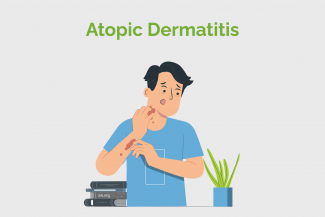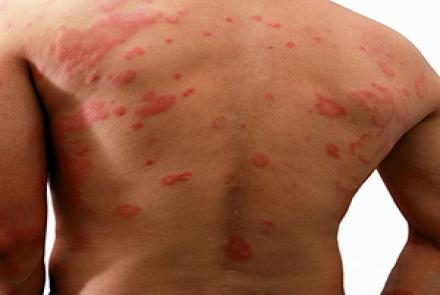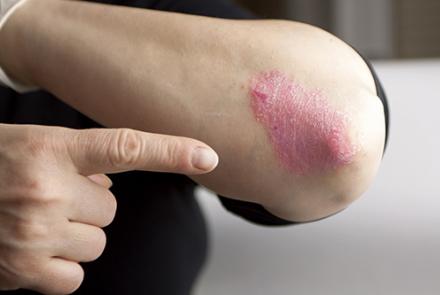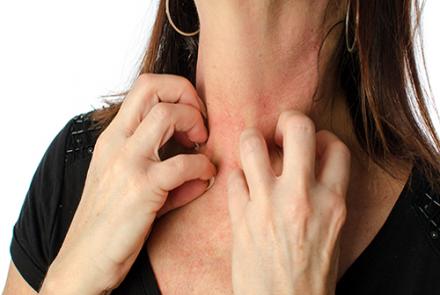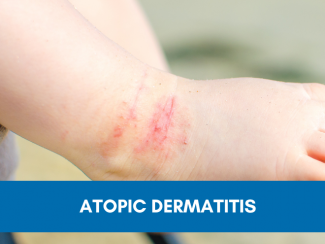
There is no one single reason for Atopic Dermatitis. Atopic Dermatitis is a result of a combination of one’s genes, various factors in the environment around us, the way the skin reacts, a defect in the skin’s barrier function and the immune system:
Heredity: The genes that one inherits, play a role in the development of Atopic Dermatitis. Children of parents who have Atopic Dermatitis or other atopic conditions like asthma or hay fever are more likely to develop this disorder. It is not uncommon to find other allergic diseases like food allergy, allergic rhinitis, hay fever and asthma in other family members. Scientists have found certain genes to be closely associated with patients of Atopic Dermatitis.
Defective Skin barrier: Our skin’s function is to act as a barrier between the environment and the internal body. Skin of patients with Atopic Dermatitis have been shown to have a defective barrier function. This results in an increased chance for substances called antigens to be absorbed into the skin.
Dysfunctional immune system: Our immune system is our main defence against invaders like bacteria, viruses, fungi, etc. In patients with atopy, the immune system is dysfunctional. There is a basic defect in the skin of atopic patients that is seen not only in affected skin, but also in normal appearing skin. Skin cells called keratinocytes are unable to put up an appropriate fight against certain germs. Also, when the skin cells are mechanically stimulated as in scratching, they release unique substances called chemokines and cytokines. These cause the skin to get inflamed i.e., red, swollen, oozing and itchy. Certain skin cells are attracted to sites of acute skin lesions. The acute skin lesions have plenty of inflammatory skin cells. Some of these are called Langerhans cells or antigen presenting cells. Langerhans cells appear to be hyperactive in the skin of people with Atopic Dermatitis. They play a unique role in the formation of allergies. They activate white blood cells called T lymphocytes in atopic skin, which produce proteins that promote an allergic response. Other skin cells produce certain substances called interleukin that further aggravate the inflammation in the skin.
Certain immune cells in the blood produce antibodies. An antibody is a special protein produced by the immune system that recognizes and helps fight and destroy viruses, bacteria and other foreign substances that invade our body. There are different types of antibodies. IgE is one of antibodies and it controls the immune system’s allergic response. IgE is normally present in very small amounts. About 80 – 90 % of patients with Atopic Dermatitis have high levels of IgE. In allergic diseases, IgE antibodies are produced in response to different allergens. When an allergen comes in contact with IgE on specific immune cells, the cells release various chemicals e.g. histamine. These chemicals cause the symptoms of an allergic reaction.
Thus in Atopic Dermatitis, there is an imbalance in the immune system. Certain parts of the immune system that are responsible for stimulating IgE are overactive and the parts that are responsible for protecting against viruses and bacteria are underactive. The immune system is so fine tuned that exposure to even a tiny amount of allergen can cause a cascade of events that result in an exaggerated response in the skin.
Neuropeptides: It is now increasingly evident that substances called neuropeptides may be involved in causing Atopic Dermatitis. These neuropeptides cause blood vessels to dilate and the skin to itch. Scratching the skin releases a neuropeptide called Substance P from nerves present in the skin, which causes a chemical called histamine to be released from mast cells in the scratched area. Elevated concentrations of histamine are found in the skin and plasma of patients with Atopic Dermatitis.
Environmental factors: Pollution and microbes have been implicated as likely to influence the genesis of Atopic Dermatitis.
It is believed that exposure to germs and bacteria early in life can cause the immune system to become stronger, more mature and less likely for allergies to develop later in life. This is known as the ‘hygiene hypothesis.’
Dermatologist Dr Belinda Vaz delves deep into the causes, types and preventive measures for Atopic Dermatitis or eczema in children.


